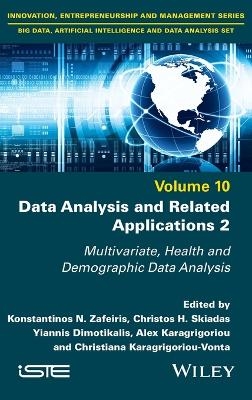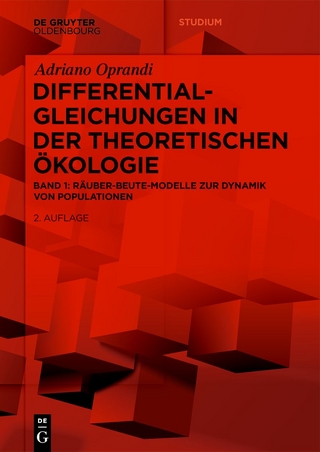
Data Analysis and Related Applications, Volume 2
ISTE Ltd and John Wiley & Sons Inc (Verlag)
978-1-78630-772-9 (ISBN)
This book is a collective work by a number of leading scientists, computer experts, analysts, engineers, mathematicians, probabilists and statisticians who have been working at the forefront of data analysis and related applications. The chapters of this collaborative work represent a cross-section of current concerns, developments and research interests in the above scientific areas. The collected material has been divided into appropriate sections to provide the reader with both theoretical and applied information on data analysis methods, models and techniques, along with related applications.
Konstantinos N. Zafeiris is Associate Professor of Demography within the Department of History and Ethnology at the Democritus University of Thrace, Greece. Christos H. Skiadas was the Founder and Director of Data Analysis and Forecasting and Former Vice-Rector at the Technical University of Crete, Greece. Yiannis Dimotikalis is Assistant Professor of Quantitative Methods within the Department of Management Science and Technology at the Hellenic Mediterranean University, Greece. Alex Karagrigoriou is Professor of Probability and Statistics, Director of the Laboratory of Statistics and Data Analysis and Actuarial-Financial Mathematics at the University of the Aegean, Greece. Christiana Karagrigoriou-Vonta is a (socio) linguist, translator and subtitler. She works as a freelance translator and editor of scientific texts and provides postproduction services (subtitling) for private companies and broadcasting corporations.
Preface xv
Konstantinos N ZAFEIRIS, Yiannis DIMOTIKALIS, Christos H SKIADAS, Alex KARAGRIGORIOU and Christiana KARAGRIGORIOU-VONTA
Part 1 1
Chapter 1 A Topological Clustering of Variables 3
Rafik ABDESSELAM
1.1 Introduction 3
1.2 Topological context 5
1.3 Topological clustering of variables -- selective review 9
1.4 Illustration on real data of simple examples 10
1.5 Conclusion 19
1.6 Appendix 20
1.7 References 23
Chapter 2 A New Regression Model for Count Compositions 25
Roberto ASCARI and Sonia MIGLIORATI
2.1 Introduction 25
2.1.1 Distributions for count vectors 26
2.2 Regression models and Bayesian inference 29
2.3 Simulation studies 30
2.4 Application to real electoral data 34
2.5 References 37
Chapter 3 Intergenerational Class Mobility in Greece with Evidence from EU-SILC 39
Glykeria STAMATOPOULOU, Maria SYMEONAKI and Catherine MICHALOPOULOU
3.1 Introduction 39
3.2 Data and methods 41
3.3 The trends of class mobility between different birth cohorts 45
3.4 Conclusion 52
3.5 References 52
Chapter 4 Capturing School-to-Work Transitions Using Data from the First European Graduate Survey 55
Maria SYMEONAKI, Glykeria STAMATOPOULOU and Dimitris PARSANOGLOU
4.1 Introduction 55
4.2 Data and methodology 57
4.3 Results 58
4.4 Conclusion 63
4.5 References 64
Chapter 5 A Cluster Analysis Approach for Identifying Precarious Workers 67
Maria SYMEONAKI, Glykeria STAMATOPOULOU and Dimitris PARSANOGLOU
5.1 Introduction 67
5.2 Data and methodology 68
5.3 Results 70
5.4 Conclusion and discussion 74
5.5 References 75
Chapter 6 American Option Pricing Under a Varying Economic Situation Using Semi-Markov Decision Process 77
Kouki TAKADA, Marko DIMITROV, Lu JIN and Ying NI
6.1 Introduction 77
6.2 American option pricing 79
6.3 Exercising strategies 80
6.4 Conclusion 89
6.5 References 89
Chapter 7 The Implementation of Hierarchical Classifications and Cochran’s Rule in the Analysis of Social Data 91
Aggeliki YFANTI and Catherine MICHALOPOULOU
7.1 Introduction 91
7.2 Methods 95
7.3 Results 96
7.4 Conclusion 101
7.5 References 102
Chapter 8 Dynamic Optimization with Tempered Stable Subordinators for Modeling River Hydraulics 105
Hidekazu YOSHIOKA and Yumi YOSHIOKA
8.1 Introduction 105
8.2 Mathematical model 108
8.3 Optimization problem 109
8.4 HJBI equation: formulation and solution 111
8.5 Concluding remarks 115
8.6 Acknowledgments 116
8.7 References 116
Part 2 119
Chapter 9 Predicting Event Counts in Event-Driven Clinical Trials Accounting for Cure and Ongoing Recruitment 121
Vladimir ANISIMOV, Stephen GORMLEY, Rosalind BAVERSTOCK and Cynthia KINEZA
9.1 Introduction 122
9.2 Modeling the process of event occurrence 123
9.3 Predicting event counts for patients at risk 127
9.4 Predicting event counts accounting for ongoing recruitment 129
9.5 Monte Carlo simulation 133
9.6 Software development 133
9.7 R package and implementation in a clinical trial 138
9.8 Conclusion 140
9.9 References 141
Chapter 10 Structural Modeling: An Application to the Evaluation of Ecosystem Practices at the Plot Level 143
Dominique DESBOIS
10.1 Introduction 143
10.2 Structural equation modeling using partial least squares 144
10.3 Material and method 150
10.4 Results and discussion 154
10.5 Conclusion 161
10.6 References 161
Chapter 11 Lean Management as an Improvement Factor in Health Services -- The Case of Venizeleio General Hospital of Crete, Greece 163
Eleni GENITSARIDI and George MATALLIOTAKIS
11.1 Introduction 164
11.2 Theoretical framework 164
11.3 Purpose of the research 168
11.4 Methodology 168
11.5 Research results 168
11.6 Conclusion 175
11.7 References 176
Chapter 12 Motivation and Professional Satisfaction of Medical and Nursing Staff of Primary Health Care Structures (Urban and Regional Health Centers) of the Prefecture of Heraklion, Under the Responsibility of the 7th Ministry 179
Mihalis KYRIAKAKIS and George MATALLIOTAKIS
12.1 Introduction 180
12.2 Methodology and material 180
12.3 Results 182
12.4 Discussion 194
12.5 Conclusion 196
12.6 References 197
Chapter 13 Developing a Bibliometric Quality Indicator for Journals Applied to the Field of Dentistry Pilar VALDERRAMA, Ana M AGUILERA and Mariano J VALDERRAMA
13.1 Introduction 199
13.2 Methodology 200
13.3 Discussion and conclusion 206
13.4 Acknowledgments 207
13.5 Appendix 208
13.6 References 210
Chapter 14 Statistical Process Monitoring Techniques for Covid-19 211
Emmanouil-Nektarios KALLIGERIS and Andreas MAKRIDES
14.1 Introduction 211
14.2 Materials and methods 212
14.3 Behavior of Covid-19 disease in the Mediterranean region 214
14.4 Conclusion 218
14.5 Acknowledgments 221
14.6 References 221
Part 3 223
Chapter 15 Increase of Retirement Age and Health State of Population in Czechia 225
Tomás FIALA, Jitka LANGHAMROVÁ and Jana VRABCOVÁ
15.1 Introduction 225
15.2 Data and methodological remarks 227
15.3 Statutory retirement age 228
15.4 Development of the state of health of population 230
15.5 Development of the state of health of population in productive and post-productive ages 232
15.6 Conclusion 234
15.7 Acknowledgment 235
15.8 References 235
Chapter 16 A Generalized Mean Under a Non-Regular Framework and Extreme Value Index Estimation 237
M IVETTE GOMES, Lígia HENRIQUES-RODRIGUES and Dinis PESTANA
16.1 Introduction 237
16.2 Preliminary results in the area of EVT for heavy tails and asymptotic behavior of MOp functionals 239
16.3 Finite-sample behavior of MOp functionals 243
16.4 A non-regular adaptive choice of p and k 247
16.5 Concluding remarks 248
16.6 References 248
Chapter 17 Demography and Policies in V4 Countries 251
Michaela KADLECOVÁ, Filip HON and Jitka LANGHAMROVÁ
17.1 Introduction 251
17.2 Demographic development in the V4 countries 252
17.3 Development of fertility and family policy 255
17.4 Pension systems of the Visegrad Four countries 258
17.5 Prediction of future development of V4 populations 261
17.6 Conclusion 265
17.7 Acknowledgments 266
17.8 References 267
Chapter 18 Decomposing Differences in Life Expectancy with and without Disability: The Case of Czechia 271
David MORÁVEK, Tomás BELOCH and Jitka LANGHAMROVÁ
18.1 Introduction 271
18.2 Methodology and data 273
18.3 Main results 276
18.4 Conclusion 281
18.5 Acknowledgments 282
18.6 References 283
Chapter 19 Assessing the Predictive Ability of Subjective Survival Probabilities 285
Apostolos PAPACHRISTOS and Georgia VERROPOULOU
19.1 Introduction 285
19.2 Methods 286
19.3 Results 292
19.4 Discussion 297
19.5 Conclusion 298
19.6 Acknowledgments 298
19.7 References 299
Chapter 20 Exploring Excess Mortality During the Covid-19 Pandemic with Seasonal ARIMA Models 303
Karl-Heinz JÖCKEL and Peter PFLAUMER
20.1 Introduction 304
20.2 Binomial mortality model and the empirical distribution of daily deaths in Germany 305
20.3 Non-seasonal ARIMA model for weekly data in Germany 307
20.4 Seasonal ARIMA models of weekly deaths for Spain, Germany and Sweden 311
20.5 Measuring excess mortality, especially in Spain, Germany and Sweden 322
20.6 Forecasting daily deaths in Germany 324
20.7 Conclusion 330
20.8 Appendix 331
20.8.1 Estimation results of the other age classes 331
20.8.2 Time series decomposition 332
20.9 References 334
Chapter 21 The Impact of Cesarean Section on Neonatal Mortality in Rural--Urban Divisions in a Region of Brazil 337
Carlos SANTOS and Neir PAES
21.1 Introduction 338
21.2 Materials and methods 339
21.2.1 Multilevel logistic model 340
21.3 Results and discussion 341
21.4 Conclusion 345
21.5 References 346
Chapter 22 Analysis of Alcohol Policy in Czechia: Estimation of Alcohol Policy Scale Compared to EU Countries 349
Kornélia SVACINOVÁ, Markéta Majerová PECHHOLDOVÁ and Jana VRABCOVÁ
22.1 Introduction 350
22.2 Literature review 351
22.3 Methods 352
22.4 Results 354
22.5 Discussion 359
22.6 Conclusion 360
22.7 Acknowledgment 360
22.8 References 360
Chapter 23 Alcohol-Related Mortality and Its Cause-Elimination in Life Tables in Selected European Countries and USA: An International Comparison 363
Jana VRABCOVÁ, Markéta Majerová PECHHOLDOVÁ and Kornélia SVACINOVÁ
23.1 Introduction 364
23.2 Data and methods 365
23.3 Alcohol consumption in European countries by the OECD 367
23.4 Czechia 369
23.5 Poland 369
23.6 Belarus 371
23.7 Russia 371
23.8 France 371
23.9 USA 371
23.10 Conclusion 374
23.11 Acknowledgment 375
23.12 References 375
Chapter 24 Labor Force Aging in the Czech Republic: The Role of Education and Economic Industry 377
Martina SIMKOVA and Jaroslav SIXTA
24.1 Introduction 377
24.2 The setting of the statutory retirement age 378
24.3 The economic status of elderly workers 379
24.4 The structure of working people by factors 380
24.5 The change in the number of workers 382
24.6 Conclusion 385
24.7 Acknowledgment 385
24.8 References 386
List of Authors 387
Index 393
Summary of Volume 1 395
| Erscheinungsdatum | 19.10.2022 |
|---|---|
| Verlagsort | London |
| Sprache | englisch |
| Gewicht | 1220 g |
| Themenwelt | Mathematik / Informatik ► Mathematik ► Analysis |
| Technik ► Bauwesen | |
| ISBN-10 | 1-78630-772-3 / 1786307723 |
| ISBN-13 | 978-1-78630-772-9 / 9781786307729 |
| Zustand | Neuware |
| Informationen gemäß Produktsicherheitsverordnung (GPSR) | |
| Haben Sie eine Frage zum Produkt? |
aus dem Bereich


